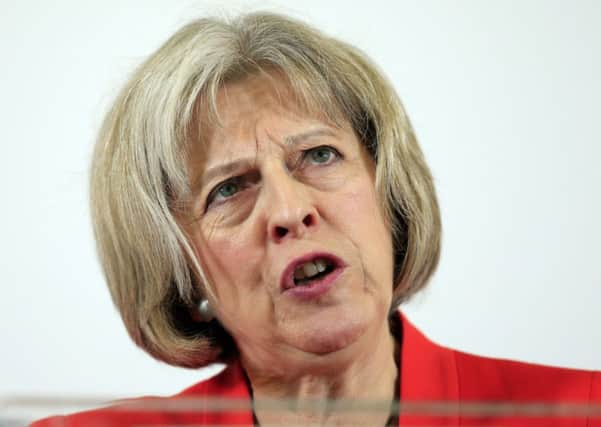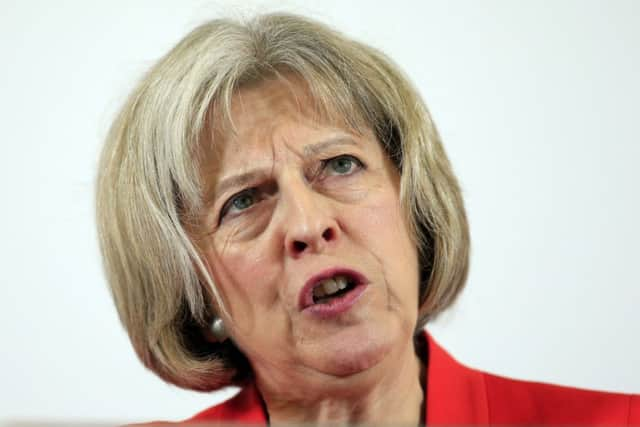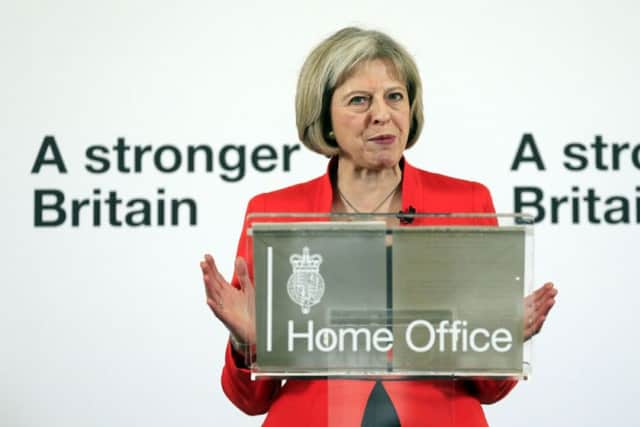Sharia law faces probe as May clamps down on Islam extremists


From launching an investigation into the use of Sharia law to promoting “British values” through social media, and from an inspection of police responses to honour crimes to stricter English language requirements, Theresa May set out how a Conservative majority government would deal with extremism.
The Home Secretary used the speech to warn radical Islamists that the “game is up” and that they are no longer tolerated in Britain, but also called on British Muslims to help tackle extremism.
Advertisement
Hide AdAdvertisement
Hide Ad“To those who choose consciously to reject our values and the basic principles of our society, the message is equally clear - the game is up,” she said.


“Where you seek to spread hate, we will disrupt you. Where you break the law, we will prosecute you. Where you seek to divide us, we will stand united and together we will defeat you.”
Among a range of far-reaching measures, the Home Secretary proposed:
• An independent figure to investigate the application of Sharia law in England and Wales
• A “positive” campaign to promote British values
Advertisement
Hide AdAdvertisement
Hide Ad

• Review of supplementary schools, which are unregulated and not inspected
• Review and reform of inspection arrangements for further education colleges
• Her Majesty’s Inspectorate of Constabulary to conduct an all-force inspection of the police response to honour crimes, female genital mutilation and forced marriage
• Migrants coming to Britain on time-limited visas would be required to sign a declaration saying they will “respect British values” while in the country
Advertisement
Hide AdAdvertisement
Hide Ad• All foreign religious workers in pastoral roles would be required to speak English
• A sharp reduction in funding for translation services and a boost to funding for English language training
• Banning orders for extremist groups that fall short of existing terrorist proscription order thresholds
• Extremism disruption orders, which would be civil powers to be used against extremists
Advertisement
Hide AdAdvertisement
Hide Ad• Closure orders for shutting down premises occupied by extremists or used to host extremist meetings
• Review Ofcom’s remit to take action against extremism broadcasts
Mrs May said extremism manifests itself in racism, anti-semitism, homophobia and sexism - but the “most serious and widespread” problem is Islamic extremism.
“Everybody living in this country is equal and everybody is free to lead their lives as they see fit,” she said. “We are free to practise any faith, follow any religious denomination, or ignore religion altogether.
Advertisement
Hide AdAdvertisement
Hide Ad“We are free to wear whatever clothes we choose. We are free to establish our own faith schools and give our sons and daughters the best education possible. We are free to build our own churches, temples and mosques and worship freely.
“But in a pluralistic society like ours, there are responsibilities as well as rights. You don’t just get the freedom to live how you choose to live.
“You have to respect other people’s rights to do so too. And you have to respect not just this fundamental principle but the institutions and laws that make it possible.”
Mrs May stressed that the “overwhelming majority” of people in Britain “accept and positively cherish” this arrangement.
Advertisement
Hide AdAdvertisement
Hide Ad“But there is increasing evidence that a small but significant number of people living in Britain - almost all of whom are British citizens - reject our values,” she added.
“We have been clear all along that the Government’s counter-extremism strategy must seek to defeat extremism in all its forms, but it’s obvious from the evidence that the most serious and widespread form of extremism we need to confront is Islamist extremism.”
The minister said extremism cannot “just be ignored” or wished away, but “must be tackled head-on”.
“Because where extremism takes root the consequences are clear,” she added. “Women’s rights are eroded. There is discrimination on the basis of race and sexuality.”
Advertisement
Hide AdAdvertisement
Hide AdYvette Cooper, shadow home secretary, said: “Every day we hear of more British citizens being groomed, radicalised and trying to travel to Syria to join a vile barbaric organisation.
“Yet Theresa May’s strategy has failed to tackle the problem.
“She has had five years as Home Secretary to do all these things, yet too many of her promises are the opposite of what she has done in Government.”
She added: “Everyone other than the extremists agree that we should robustly defend and actively promote the pluralistic values our society rightly holds in esteem.
Advertisement
Hide AdAdvertisement
Hide Ad“But it isn’t enough for the Home Secretary to say it, she needs to act.
“We need to work in as many communities as possible, throughout the UK, to support civil society and defeat extremism.
“And we should never tie the hands of our agencies and the police in confronting dangerous, violent extremists. The Government’s record is one of making that harder, not easier.”